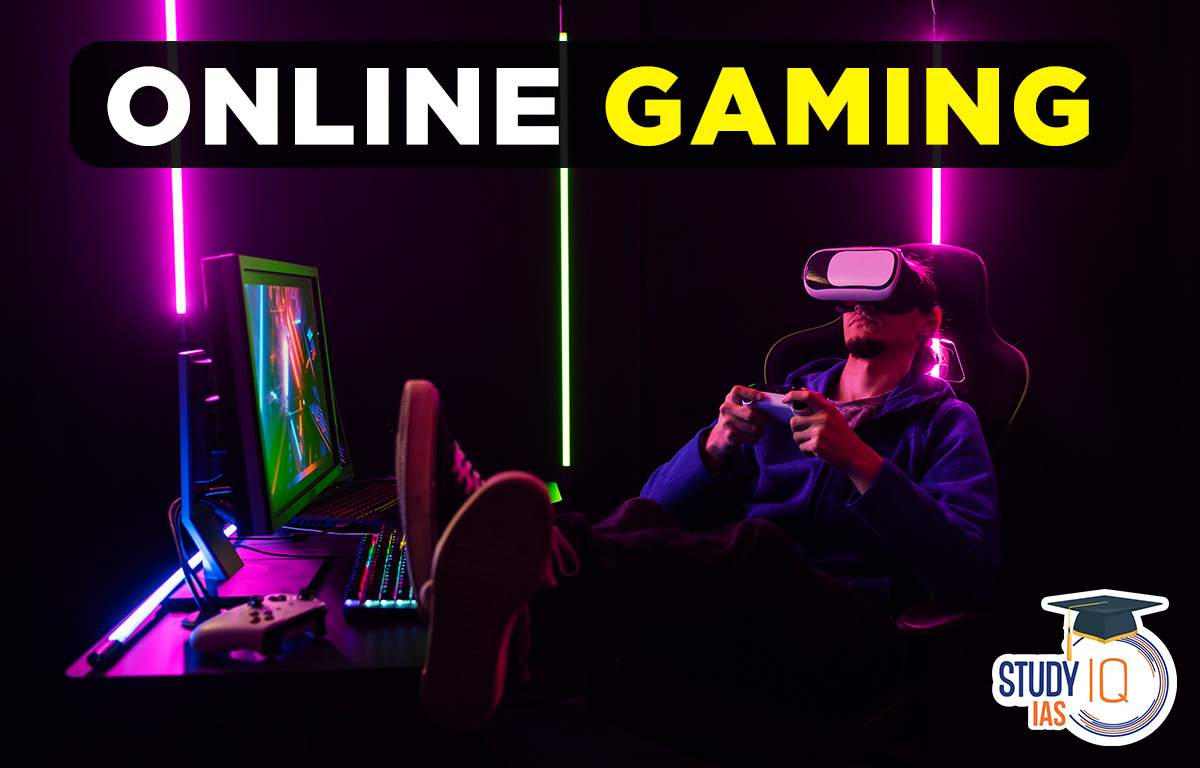Table of Contents
Context: Parliament cleared amendments to the Goods and Services Tax (GST) laws to facilitate the levy of 28% GST on the face value of all bets made in casinos, horse-racing and online gaming in India.
More on the News
- The uniform levy of 28 per cent tax will be applicable on
- the face value of the chips purchased in the case of casinos,
- the full value of the bets placed with bookmaker/totalisator in the case of horse racing, and
- the full value of the bets placed in case of online gaming.
- Now online gaming and horse racing will be included in Schedule-III of the Central GST Act 2017, deeming them as taxable actionable claims.
- An actionable claim refers to a claim to an unsecured debt or a claim to any beneficial interest in movable property that is not in the possession of the claimant.
- So far, lottery, betting, and gambling were classified as actionable claims. Now, horse racing and online gaming will be added.
- Concerns with the move:
- Several online gaming companies expressed that the GST Council’s decision is “unconstitutional and irrational” and will wipe out the entire Indian gaming industry and lead to lakhs of job losses.
- They have also expressed that the only people benefitting from this will be anti-national illegal offshore platforms.
- Arguments by the government:
- Moral Question: The government believes that it is a moral question of whether the gaming industry, including online gaming, should receive greater encouragement than essential goods.
- Addressing Social Concerns: The government’s decision is driven by concerns over the potential negative impacts of excessive gaming, including addiction, health issues, and social dysfunction.
What is Online Gaming?
- The term “online gaming” refers to games that can only be played with an internet connection. This is a part of the sunrise industry with a growing demand for game access.
- Across the world, the popularity of online gaming has grown significantly in recent years, driven by various factors such as technological advancements, increased internet accessibility, the proliferation of smartphones, and the rise of esports.
India’s Online Gaming Industry
- India’s gaming market is expected to grow from $2.8 billion in 2022 to a whopping $5 billion by 2025, growing at a compounded annual growth rate (CAGR) of 28-30 percent.
- The number of gamers in the country is expected to expand from 420 million in 2022 to hit 500 million by 2025.
- Between 2017 and 2020, the country’s gaming industry expanded at a CAGR of 38 percent, compared to 8 percent in China and 10 percent in the US.
- According to the World Economic Forum (WEF), mobile devices are the primary drivers of India’s gaming industry.
Key Growth Drivers of India’s Online Gaming Industry
- Large and Young Population: India has a significant young population, with about half of its population under the age of 25. This demographic segment is more likely to engage in online gaming, contributing to the industry’s growth.
- Increasing Smartphone Penetration: The availability of affordable smartphones has led to a significant increase in smartphone users in India. Easy access to smartphones enables more people to participate in online gaming.
- Rising Internet Users: India is the second-largest country in terms of internet users. The growth in internet users creates a larger potential user base for online gaming platforms.
- The Pandemic Push: The growth was significantly aided by the pandemic, which allowed people to explore all kinds of gaming choices within the confines of their homes.
- Localization and Regional Content: Games and in-game content that are tailored to the Indian market have gained popularity. Localization efforts, such as incorporating Indian themes, festivals, and regional languages, have made online games more appealing to the Indian audience.
- Booming IT Sector: The country has seen a significant increase in the number of online game developers, which has contributed to the development of innovative games and technologies.
- Digital Payment Adoption: The widespread adoption of digital payment methods has facilitated online transactions in the gaming industry.
Legal and Regulatory Framework for Online Gaming in India
- Any online gaming platform (domestic or foreign) offering real money online games to users of India will have to be a legal entity incorporated under Indian law.
- The Prevention of Money Laundering Act of 2002 will treat these platforms as “reporting entities.”
- These platforms will be required to notify the Financial Intelligence Unit India of any suspicious transactions.
- Most states allow skill-based games, but some don’t allow games of chance, which are considered gambling and immoral.
- A game of skill refers to a type of game where the outcome is primarily determined by the skill, knowledge, strategy, or expertise of the player rather than chance or luck.
- A game of chance, also known as a game of luck, is a game in which the outcome is predominantly determined by random or unpredictable elements.
- Online gaming has always been regulated by the state, but state governments find it tough for them to enforce rules like geo-blocking certain apps or websites within their borders.
- Games of skill have been restricted in Assam, Andhra Pradesh, Nagaland, Odisha, Tamil Nadu, and Telangana.
- MeitY may serve as the nodal ministry for the regulation of online gaming, except for the e-sports category, which falls under the purview of the Department of Sports.
- Esports, short for electronic sports, refers to organized competitive video gaming where professional players or teams compete against each other in various video games.
Benefits of Online Gaming
- Economic Growth: The growth of the online gaming industry contributes to economic development by generating revenue through taxes and creating opportunities for infrastructure improvement.
- Promotion of Innovation: Online gaming drives innovation and technological advancements, particularly in immersive technologies like augmented reality (AR) and virtual reality (VR).
- Employment Opportunities: Online gaming creates a significant number of jobs, particularly in technology startups, animation, live streaming, and video-on-demand sectors.
- Enhanced Education: Educational online games can facilitate learning and engagement for children by incorporating interactive elements and cultural aspects.
- Expansion of Sports: The rise of esports and online gaming introduces a new dimension to sports. Esports events and competitions allow users to represent their nations and win accolades.
- For example, esports were included as medal events in the 2022 Asian Games.
- Combatting Illegal Activities: Online fantasy games with regulated betting and wagering elements can help curb illegal betting, gambling, and money laundering activities.
- Substance Abuse Reduction: Online gaming provides a convenient and accessible platform for entertainment, allowing people to play from the comfort of their homes. This can reduce the likelihood of substance abuse, which is often associated with physical betting places or casinos.
Concerns associated with Online Gaming
- Physical and Psychological Harms: Some online games can contribute to aggressive behavior and extreme attachment to technology, leading to increased violence and self-harm in society.
- Examples include instances like the Blue Whale Challenge, an online suicide game.
- Gaming Addiction: The constant availability and accessibility of online games can lead to addiction, which can result in social dysfunction, poor social skills, and financial losses.
- Health Issues: Excessive gaming result in stress, anxiety, depression, disrupted sleep patterns, and unhealthy eating habits.
- Poor Educational Performance: Easy access to online games, particularly among children, can interfere with school and educational performance.
- Technological Risks: In online gaming, there is huge potential for technological risks such as data thefts, privacy invasions, cyber-attacks, and financial frauds.
- Negative Impact on Vulnerable Sections: The rise in violence, financial losses etc. can increase violence/crimes against women and children at home and outside.
- In 2022, a 16-year-old boy from Lucknow shot dead his mother for scolding him for playing the online game PUBG.
- Lack of Uniformity: Different states in India have different laws regarding betting and gambling. This lack of uniformity can create confusion and limited legal awareness among players and authorities, leading to inconsistencies in the regulation of online gaming activities.
Government Initiatives
- Digital Gaming Research Initiative: To support the Indian digital gaming research space and industry. The Science and Engineering Research Board (SERB) of the Department of Science and Technology has identified three main directions for its Digital Gaming Research:
- R&D in learning and leisure gaming platforms,
- Immersive game prototypes with an emphasis on Indian culture and values, and
- A collaborative technical design process, which was made by SERB Game Labs.
- AVGC Promotion Task Force: The Ministry of Information and Broadcasting has established the Animation, Visual Effects, Gaming and Comic (AVGC) Promotion Task Force.
- The government recognizes that the Indian AVGC industry has the ability to carry the “Make in India” and “Brand India” banners.
Way Forward
- MeitY Taskforce Report: The Ministry of Electronics and Information Technology (MeitY) has constituted a taskforce to suggest recommendations for regulating India’s online gaming industry. In its report, the taskforce recommended the following:
- Central-Level Law for Online Gaming,
- A regulatory body for the Online Gaming Industry, and
- Three-Tier Dispute Resolution Mechanism.
- Curbing Economic Losses: Introduce measures to curb excessive financial losses in online gaming.
- For example, implementing a cap on the number of transactions an individual can make across platforms or within a single platform can help prevent significant economic losses.
- Information, Education, and Communication (IEC): To raise awareness about the potential risks and benefits of online gaming.
- Parental Supervision: Parents should actively supervise their children’s online gaming activities. This includes monitoring the type of games they play, the time spent gaming, and ensuring that gaming does not negatively impact their education and well-being.


 Serious Fraud Investigation Office (SFIO...
Serious Fraud Investigation Office (SFIO...
 Article 142 of Indian Constitution, Sign...
Article 142 of Indian Constitution, Sign...
 Pakistan-Occupied Kashmir (PoK): History...
Pakistan-Occupied Kashmir (PoK): History...





















